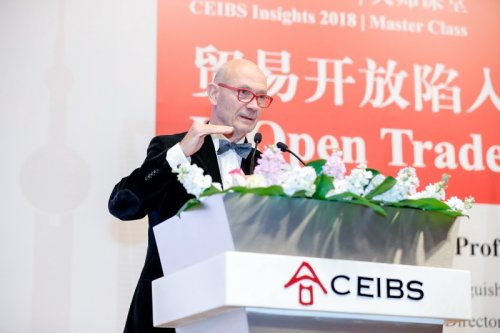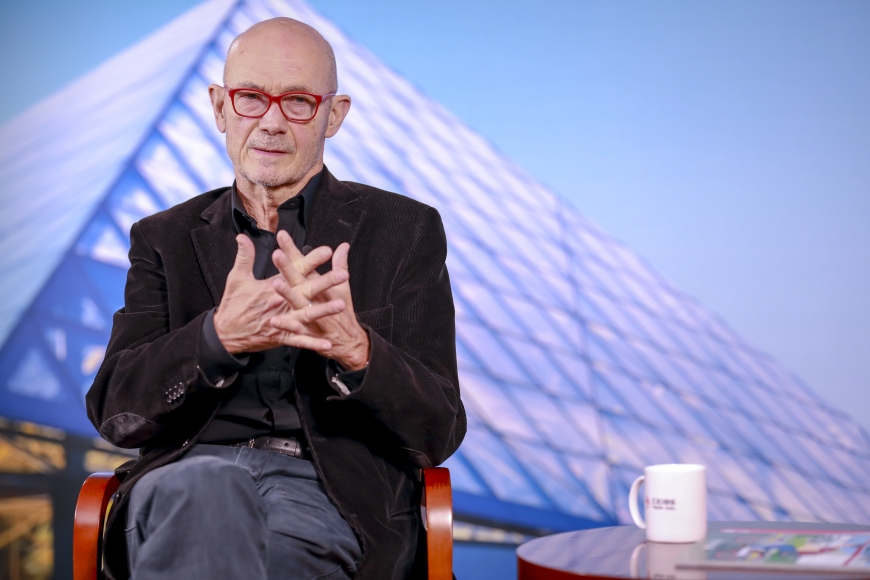In-depth: Pascal Lamy Talks Global Trade

By Charmaine N Clarke
Year 2019 begins with the state of global trade no less uncertain than it was when 2018 drew to a close. As the world waits to see whether the economic landscape and the rules of open trade that underpin it have been irrevocably transformed, we share the views of renowned trade expert, former World Trade Organization (WTO) Director-General Pascal Lamy, now Distinguished Professor at CEIBS. Here are excerpts from an exclusive interview with Prof Lamy at CEIBS Shanghai Campus on December 10, part of the year-long CEIBS Insights 2018 Project.
Is the current state of global trade, one where we have increasing trade tensions and age-old rules being rewritten, the ‘new normal’?
If you look at the medium and long-term, global trade is doing well. Trade is roughly more open than it was before. But we have a short-term problem, given this new US stance. It’s too soon to say whether it’s a parenthesis, whether it’s a bad moment we have to live through, or whether it will result in a change of paradigm. But it clearly is a rupture, as compared to a long-term trend of increasing trade and globalization.
Going forward, how can we minimize trade disputes?
There are various issues behind the current trade disputes, but we Europeans see a Sino-US rivalry as the main dimension. There are reasons why Trump was elected on a protectionist platform, [and these] have to do with the US economic and social system, which left [behind] too many people who then vented their frustration and anger, which Donald Trump very cleverly [capitalised upon].
Trade opening is part of that economic and social pain in the US, though not the main part, in my view. This is on top of a trend of tensions between US and China, which had been reasonably contained in previous US administrations and by previous generations of Chinese leaderships.
What has changed is that, on one side, the US has become more aggressive, moving from a policy that is about containing China to a policy that is about pushing back China. And on the Chinese side it’s also probable that the Chinese leadership has turned more affirmative that the China model was on offer for the rest of the world.
So these two things coexist and, at the end of the day, the big question — at least for us Europeans — is whether this Sino-US rivalry will remain contained and if it’s about habitual trade war; or whether this tension will rise. We all have a big interest in this remaining contained.
It’s inescapable that this rebalancing of power between US and China will first create turbulence. It has always been the case in history. Previously, most of these rebalancings led to quite dramatic developments worldwide, like wars. Not this time. And I personally believe that we’ve reached a stage of globalization that allows us to contain these tensions. Although if the US really would want to de-globalize, then the situation would become more dangerous, both on the US side and on the Chinese side. If the purpose is to disentangle US and China economically, technologically, politically, there may be camps on both sides that have this option in mind, which I think is worrying.
 Within the context of the points you have just raised, what advice would you offer to the US in terms of how it deals with China on these issues?
Within the context of the points you have just raised, what advice would you offer to the US in terms of how it deals with China on these issues?
My advice to the US is that the world is a better place with a China that is open, not closed. And so this sort of aggressiveness vis-à-vis China has a risk, which is reinforcing, on the Chinese side, the part of the leadership within the Politburo that believes — and probably has always believed — that China has gone too far in opening, in trusting these long-nosers (westerners). I think this is dangerous, which is why I would advise the US to keep the previous policy, which was one of trying to bring China as a major responsible stakeholder of the global world we live in, rather than cornering China in a way that probably could make it more dangerous.
And your advice to China?
My advice to China is try and keep the balance which has been there for the last 30 years; where the forces of openness have been bigger than the forces of being closed. China is a huge country! History has seen shifts from closing to opening which are understandable given the size of the country.
I believe the US stance originated in the view that China is a danger for the US, that the rise of China and the demise of US is a problem. I would try and give signals to the rest of the world, including to the US, that China’s rise is something that can be done peacefully and there’s nothing such as intentions like, for instance, stealing intellectual property, which as you know, are sometimes quite high in the headlines.
US President Donald Trump’s dissatisfaction with the WTO has been well documented, as have been suggestions that we may end up with a WTO-minus-US scenario. At this point in time, how likely is that? And what would that mean for China’s global role?
WTO-minus-US is only plan B. We first have to work on plan A, which is keeping US within the WTO tent, which implies a number of changes in order to address some of the criticisms the US has vis-à-vis WTO. Some of them, in my view, are reasonable. Some of them are excessive, but some of them are reasonable.
Now, if plan A doesn’t work, or if the US puts forward conditions — [for example if they say it’s] my way or no way — others in the WTO have to realise that you cannot negotiate with a knife on your throat. So, making sure that the negotiating game remains balanced and is not captured by the US [requires] that another option is on the table. Again, not that it’s the preferred one; but if you want plan A to succeed, you sometimes need a plan B.
If we have to resort to plan B, it would probably mean that China would have to exercise a larger authority within the WTO. And whether [we end up using] plan A or plan B, this necessitates some global rules to better discipline some of the Chinese trade practices — and notably in the area of subsidisation. China, a big player on the trade scene, still remains a sort of oddity as long as one-third of its economy is still under state command. This is a system that the coexistence of which, with global open market capitalism, necessitates a bit of attention.
The reality is that the rules of WTO, as of today, are probably not totally fit for purpose given the size, the speed, and the force of China in the world economy. China joined the WTO many years ago, and since then not much has changed. And there is a discrepancy between rules that, for a variety of reasons, have remained unchanged and the big changes [that have taken place] in the world economy, notably brought by the rise of China. So this needs to be adjusted. And whether plan A or plan B, China has to become more of a responsible stakeholder in the global trade system.
At the same time, the Chinese issue of subsidies is not the only one [that highlights changes needed to the WTO rules]. Many developing countries believe, for instance, that the US subsidisation of agriculture is something that is not fair. There are areas like the digital economy, which is a new frontier of economies in many countries, that are not really dealt with by WTO rules because in those countries the problem at the time the WTO rules were being made was an obstacle to trade in textiles or steel or aluminium.
The world of big data, the questions of whether the data is accessible, whether it is protected, whether it has to be localized as it becomes essential raw material of the economy, these are areas where WTO needs to adjust. But of course, this can only be done if the members of WTO, who are the legislators who agreed to the rules, agree to do that. And for that, you need this US-China tension to ease.
Apart from the current US-China trade tensions, what are the other hurdles to making the changes needed in the WTO?
There are many reasons; the main one is that the WTO was constructed at a time when you had developed countries on one side and developing countries on the other side. And the rule was that developed countries would open trade between themselves with a reciprocity principle [that said]: as developing countries were weaker, they were entitled to asymmetry. They would have to open trade, but less than bigger, stronger countries that were already developed.
Now that was the world of the ’80s. This has changed. Whether China is a developing country or developed country is a matter of judgement.
We need to adjust this vision that you are either developed or developing. Emerging countries, by definition, are developing countries who are becoming developed countries, and this has a lot of consequences on the trade regime, which I think needs to be accepted.
If you were now Director-General of the WTO, what’s the first thing that you would do?
It’s always imprudent to give advice to one’s successor, and I think the role of the Director-General of WTO is to propose a way out of the present crisis, in order to keep as many WTO members possible around the table.
[That means] listening to the problems of the US, EU, Africa, China. They all have problems. They now agree that WTO should be reformed, which is a good thing, although what you put in this reform may be quite different [depending on whom you ask]. We’ve taken a step forward; the G20 opened the discussion so the box is open. The question now is what you put in that box. I wouldn’t advise on spending too much time for the scoping exercise. We know there are two or three or four issues that need to be addressed in the short term.
You are now at the CEIBS Shanghai Campus for a week of lectures and meetings with students, alumni and faculty, the first visit of your three-year tenure as a CEIBS Distinguished Professor. Why did you accept this role and what will your focus be during this time?
CEIBS is a very good example of cooperation between Europe and China. It’s a success story; joining a success story is always a good thing to do.
Also, I’ve always had a deep interest in China. I spent 15 years of my life working for the European Union so it’s a connection I value. I think I can bring the people here, both faculty and students, something from my experience. And then lastly, I think I can learn. The young people here, they’ve got good questions, they’ve got ambitions, they’ve got a view of the world that I need to learn. So it’s for all these reasons that, when I was invited by Dean Ding Yuan to come here, my time for reflection was rather short.
Trade is a bit of a turbulent world for the moment and I don’t expect it to be much calmer next year or the year after. I think it’s a period of both tensions and changes and I think this is a good period for trying to understand what’s happening, trying to analyse what’s happening, trying to discuss and debate. So these three years will probably be a bit hectic, but all the more interesting.
More content from Lamy’s week-long visit to CEIBS
China Doesn’t Cheat on Trade, Says Former WTO Director-General
Former WTO Director-General Pascal Lamy Headlines CEIBS Master Class















